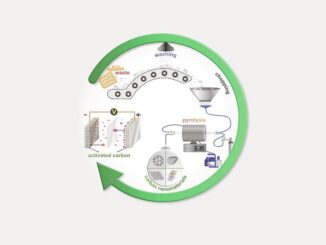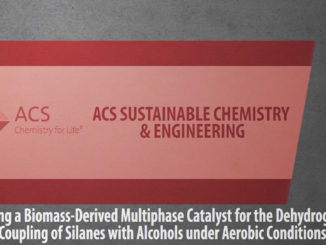
Perylenediimide-Incorporated Covalent Triazine Framework: A Highly Conductive Carbon Support for Copper Single-Atom Catalysts in Electrocatalytic CO2 Conversion
Abstract: Here, we show that a perylenediimide-incorporated covalent triazine framework (PDI-CTF) leads to an adequate conductive carbon support for copper single-atom catalysts (Cu-SACs), allowing the selective electroreduction of CO2 to methanol. CTF-Cu-SACs converted CO2 into methanol with a faradaic efficiency of 72.6% at a low overpotential (0.2 V vs RHE). While increasing the overpotential (0.2 to −0.4 V vs RHE), CTF-Cu-SACs promoted syngas (CO and H2) production with faradaic efficiencies of 53.2 and 39.5%, respectively. Moreover, CTF-Cu-SACs led to robust catalytic stability for 20 h of continuous electrolysis in an aqueous solution. Notably, it was observed that additional nitrogen doping to the PDI-CTF profoundly influences product selectivity, possibly due to the synergetic effect of highly conductive pyrolyzed CTF and N-chelating ligands with rich active sites. Our results indicate that the PDI-CTF-based Cu-SACs provide abundant active sites for CO2 adsorption, thus enhancing intermolecular ion and charge transportation that efficiently reduces CO2 into methanol in an aqueous system.
Author(s): Sebastian Raja, Gelson T. S. T. da Silva, Eduardo A. Reis, Jean C. da Cruz, Anelisse Brunca Silva, Marcelo B. Andrade, Govindasami Periyasami, Perumal Karthikeyan, Igor F. Perepichka, Lucia Helena Mascaro, and Caue Ribeiro
Energy Fuels
Published: November 15, 2023
DOI: https://doi.org/10.1021/acs.energyfuels.3c03268
CDMF
The CDMF, hosted at the Federal University of São Carlos (UFSCar), is one of the Research, Innovation and Dissemination Centers (RIDC) supported by the São Paulo State Research Support Foundation (Fapesp), and also receives investment from the National Council Scientific and Technological Development (CNPq), from the National Institute of Science and Technology of Materials in Nanotechnology (INCTMN).




